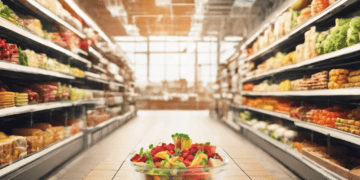In recent years, blockchain technology, initially recognized for its association with the surge in Bitcoin prices in late 2017, has gained prominence as a transformative force in various sectors, including finance and the food industry. This article explores the application of blockchain in the food supply chain, drawing parallels with its impact on the financial sector.
Blockchain technology is renowned for providing a secure and reliable framework for multiple parties to engage in transactions, eliminating bureaucratic obstacles and fostering trust. According to Richie Etwaru, Adjunct Professor of Blockchain Management at Syracuse University, blockchain addresses the crucial aspect of trust in commerce.
In the financial sector, blockchain has streamlined processes such as cross-border payments, reducing the reliance on intermediaries and significantly cutting down settlement times and costs. The food industry, too, stands to benefit from this technology by enhancing transparency in food safety and fortifying brand value.
Historically, the supply chain industry has faced challenges due to slow communication processes among various stakeholders. In a bid to modernize and digitize the supply chain, shipping company MAERSK collaborated with IBM Hyperledger. The objective is to create a tamper-proof global system that digitizes trade workflows and tracks shipments end-to-end. This initiative aims to infuse more trust, security, transparency, and simplicity into the movement of goods across trading zones.
In the food industry, blockchain’s potential lies in reducing inefficiencies, offering transparency in food safety, and strengthening brand value. Cross-border payments, inherent in food imports and exports, often involve delays and complications. Blockchain’s direct peer-to-peer transactions eliminate the need for third-party validation, ensuring shorter payment times and timely compensation for every actor in the food chain.
A digitized supply chain powered by blockchain could prevent fines, reduce delays, and minimize the risk of food-borne illnesses and spoilage. The 2006 spinach E.coli outbreak in the U.S. underscores the repercussions of poor supply chain management and food safety issues, leading to severe economic and health consequences.
The shared ledger characteristic of blockchain enables producers to include supply chain partners in the same system, facilitating better visualization and management of the process. As digitized data accumulates, companies may leverage artificial intelligence to enhance product quality.
Alessandro Voto, West Coast Regional Director at ConsenSys, envisions blockchain technology enabling the food industry to share assets and information easily, cheaply, and safely. Automation of trade finance and the exchange of digital tokens could simplify payments, especially across borders. Additionally, digital smart contracts on farms could reduce the legal burden of forming cooperatives.
Trusted supply chain data can also empower customers to trace the origin of their food, maintaining privacy without compromising information exchange. Concerns about scalability and data integrity on the blockchain are acknowledged, with efforts underway to establish best practices for tracking hardware and reporting processes in the food industry.
Just as blockchain revolutionized banking and supply chain efficiency, its application in the food industry holds promise. Future endeavors in this space may involve investing in software-hardware integration, reinforcing trust in traceability, and promoting awareness and education about blockchain technology.
Stay current with supply chain report news at The Supply Chain Report. For international trade resources, visit ADAMftd.com.
#BlockchainTechnology #BlockchainInFood #FoodSupplyChain #SupplyChainInnovation #IBMHyperledger #Maersk #FoodSafety #TransparencyInFood #DigitalSupplyChain #CrossBorderPayments #BlockchainInFinance #FoodTraceability #SmartContracts #BlockchainForTrust #DigitalTransformation #AIInSupplyChain #FoodIndustryInnovation #BlockchainForHealth #BlockchainInCommerce #FoodSecurity #BlockchainRevolution















